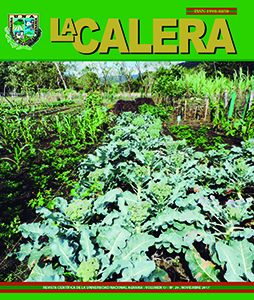Broad mite (Polyphagotarsonemus latus, Banks.) population incidence and other arthropod pests in polyculture and pure crop arrangements in Tisma, Nicaragua
DOI:
https://doi.org/10.5377/calera.v17i29.6525Keywords:
Monoculture, polyculture, sweet pepper, broad miteAbstract
Polycultures play an important role in the biodiversity of agroecosystems, they promote ecological services such as nutrient cycling, biological control of pests, diseases and weeds, increased biomass production, soil and water conservation, improvement physical-chemistry soil properties, reduced toxicity by avoiding the over use of pesticides. This study was conducted in the municipality of Tisma, Masaya in the farm “El Chagüite” in the months of September to November 2014, in order to compare two planting systems, monoculture and polyculture, on the population of pests and benefi cial arthropods; as well as the severity of the attack of broad mite in sweet pepper. For the development of this research, four experimental plots were arranged; one with the arrangement of sweet pepper, corn, cassava, quequisque, and tomato; the other three were established in monoculture of sweet pepper, corn and tomato respectively. The weekly evaluated variables were, the population incidence of pests and beneficial arthropods present in the culture of sweet pepper. Broad mites incidence and severity present in the cultivation of sweet pepper were also recorded. Additionally, the production of sweet pepper, corn, and tomato were harvested in order to calculate the land equivalent ratio (LER). A general trend of lower occurrence of pests, lower population density of white mite, higher population density of beneficial arthropods and better land use per unit area in polyculture planting system was observed.
Downloads
1599

